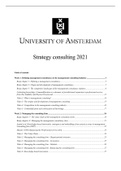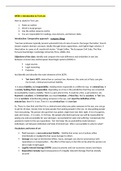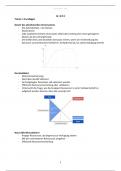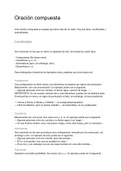Behavioral Disorders in Children
Description
The purpose of this e-book is to promote understanding of behavioral disorders in children. This
e-book covers causes of behavioral disorders, characteristics of behavioral disorders, social and
educational implications of behavior and emotional disturbance.
, CHAPTER ONE
Causes of Behavior Disorders in Children
Introduction
In children, many factors can be said to be responsible for behavior disorders observed
in children. These factors include family and social factors that play the greatest role in
shaping children’s behavioral disorders; biological factors which determine how well or
how bad the child will interact with the environment. The third category of the factors
influencing children behavior is the school and its environment. Apart from book work,
there are foreign people the child has to adjust to and new set of rules and regulations
governing the behavior of the child. Since these children come from different family and
cultural backgrounds, the child is bound to be impacted differently by these school
environmental factors differently and some behavioral adjustment disorders might
appear in a child who once had no such behavior disorders. It is therefore the work of the
families, teachers and immediate school communities to work in a concerted manner to
shape the child’s behavior morally, socially and academically for the future well-being of
the child.
Family and Social Factors
An individual child first interacts with the family members. The child asserts oneself in a
manner that will enable him/her to please his parents first and the siblings if they are
there. The child who does not please the parent feel afraid of the parent and therefore the
parent may ends up having negative attitude towards the child. Such negative attitude on
side of the parent may influence the child’s behavior either negatively or positively.
Life events, emotional stress and relationships
It is reported that there is good evidence on the importance of psychosocial influences on
psychopathology in general, although less known about the specific risk and protective
mechanisms. Maltreatment in childhood and in adulthood, including sexual abuse,
physical abuse, emotional abuse, domestic violence and bullying, has been linked to the
development of mental disorders, through a complex interaction of societal, family,
psychological and biological factors. Negative or stressful life events more generally
have been implicated in the development of a range of disorders, including mood and
anxiety disorders. The main risks appear to be from a cumulative combination of such
experiences over time, although exposure to a single major trauma can sometimes lead to
psychopathology, including PTSD. Resilience to such experiences varies, and a person
may be resistant to some forms of experience but susceptible to others. Features
associated with variations in resilience include genetic vulnerability, temperamental
characteristics, cognitive set, coping patterns, and other experiences.
Relationship issues have been consistently linked to the development of mental disorders,
with continuing debate on the relative importance of the home environment or
work/school and peer group. Issues with parenting skills or parental depression or other
problems may be a risk factor. Parental divorce appears to increase risk, perhaps only if
,there is family discord or disorganization, although a warm supportive relationship with
one parent may compensate. Details of infant feeding, weaning, toilet training etc. do not
appear to be importantly linked to psychopathology. Early social privation, or lack of
ongoing, harmonious, secure, committed relationships, have been implicated in the
development of mental disorders.
Some approaches, such as certain theories of co-counseling, may see all non-neurological
mental disorders as the result of the self-regulating mechanisms of the mind (which
accompany the physical expression of emotions) not being allowed to operate.
Neighborhoods, Society and Culture
Problems in communities or cultures, including poverty, unemployment or
underemployment, lack of social cohesion, and migration, have been implicated in the
development of mental disorders. Stresses and strains related to socioeconomic position
(socioeconomic status (SES) or social class) have been linked to the occurrence of major
mental disorders, with a lower or more insecure educational, occupational, economic or
social position generally linked to more mental disorders. There have been mixed
findings on the nature of the links and on the extent to which pre-existing personal
characteristics influence the links. Both personal resources and community factors have
been implicated, as well as interactions between individual-level and regional-level
income levels. The causal role of different socioeconomic factors may vary by country.
Socioeconomic deprivation in neighborhoods can cause worse mental health, even after
accounting for genetic factors. In addition, minority ethnic groups, including first or
second-generation immigrants, have been found to be at greater risk for developing
mental disorders, which has been attributed to various kinds of life insecurities and
disadvantages, including racism.
The direction of causality is sometimes unclear, and alternative hypotheses such as the
Drift Hypothesis sometimes need to be discounted.
Mental disorders have also been linked to the overarching social, economic and cultural
system. A value system that promotes individualism, weakens social ties, and creates
ambivalence towards children, is being spread or imposed via globalization, yet could
adversely affect children's mental health
Some of the factors related to family and social image and have a negative impact on the
child’s behavior include:
i) Parent-child Relationship
A child healthy personality growth depends upon parental altitude. A child has emotional
needs of affection love, warmth protection, acceptance, security recognition from parent.
If deprived of them he develops a problem. On the other hand too much of security and
protection may takes the child dependent
ii) Broken Home
, A broken home can be caused by death, separation or divorce of parents. A home can
also be psychologically or emotionally wreaked and in such nobody cares about the well-
being of the child. Children from such homes lack the tips of raising healthy children
from the parents. Below are Tips of Raising Healthy Children.
Successful parenting requires you to make the effort to understand what your child
requires to grow into a confident, happy, well adjusted kid. Given below are six tips that
will assist you in achieving this.
a) Teach by Example: You want your children to be healthy, happy, attractive,
communicative and kind. Ensure you and your spouse share healthy, loving
communications, eat right, dress right and have a home that is a safe and secure space.
Your child will learn by watching you.
b) The power of Touch: Touching your child lovingly imparts a sense of
acceptance and being loved. Be physical with your child. Children derive immense
strength and confidence from knowing they are attractive and loved. Hold your children
often, touch them, kiss them and make them feel good about themselves. If they
know they are loved by you, they will learn to love themselves. And that's a sure way for
them to grow into emotionally strong, stable and well-adjusted adults.
c) Listen: Give your children appropriate listening when they're communicating
with you. For one thing, they will feel acknowledged and have a greater sense of self-
worth. Also, you will find them listening to you too in return. You want to be heard by
your children, learn to listen to them.
d) Integrity: Teach your children the importance of integrity. It will stand them in
good stead. For this, you will have to be honest and treat them with integrity at all times.
They will then be willing to emulate you.
e) Teach them to enjoy Learning: This is a very important aspect to prepare your
child to deal with life. Learning is an ongoing process and is important in whatever they
do. So, teach them to read. Start by reading to them and then get them interested in
reading for themselves.
Also, get involved with whatever interests them. Show them how to learn and excel in
whatever catches their interest. It may be very simple things like painting, or playing ball.
But by participating with them and getting better yourself, you teach them to reach for
better standards.
f) Encourage them to be Sociable: Encourage your children to have friends and to
be kind and friendly. You can do this by first of all, being polite and sociable with your
friends and acquaintances. Build up your child's confidence in himself, so that he is
comfortable in the company of others.
It is important for you to have your child feel secure, well accepted and proud of his
home. Encourage him to have his friends over and treat them appropriately so that your
child enjoys inviting his friend’s home. When all such tips miss in a child, emotions and
mood disorder dominate the child.
Description
The purpose of this e-book is to promote understanding of behavioral disorders in children. This
e-book covers causes of behavioral disorders, characteristics of behavioral disorders, social and
educational implications of behavior and emotional disturbance.
, CHAPTER ONE
Causes of Behavior Disorders in Children
Introduction
In children, many factors can be said to be responsible for behavior disorders observed
in children. These factors include family and social factors that play the greatest role in
shaping children’s behavioral disorders; biological factors which determine how well or
how bad the child will interact with the environment. The third category of the factors
influencing children behavior is the school and its environment. Apart from book work,
there are foreign people the child has to adjust to and new set of rules and regulations
governing the behavior of the child. Since these children come from different family and
cultural backgrounds, the child is bound to be impacted differently by these school
environmental factors differently and some behavioral adjustment disorders might
appear in a child who once had no such behavior disorders. It is therefore the work of the
families, teachers and immediate school communities to work in a concerted manner to
shape the child’s behavior morally, socially and academically for the future well-being of
the child.
Family and Social Factors
An individual child first interacts with the family members. The child asserts oneself in a
manner that will enable him/her to please his parents first and the siblings if they are
there. The child who does not please the parent feel afraid of the parent and therefore the
parent may ends up having negative attitude towards the child. Such negative attitude on
side of the parent may influence the child’s behavior either negatively or positively.
Life events, emotional stress and relationships
It is reported that there is good evidence on the importance of psychosocial influences on
psychopathology in general, although less known about the specific risk and protective
mechanisms. Maltreatment in childhood and in adulthood, including sexual abuse,
physical abuse, emotional abuse, domestic violence and bullying, has been linked to the
development of mental disorders, through a complex interaction of societal, family,
psychological and biological factors. Negative or stressful life events more generally
have been implicated in the development of a range of disorders, including mood and
anxiety disorders. The main risks appear to be from a cumulative combination of such
experiences over time, although exposure to a single major trauma can sometimes lead to
psychopathology, including PTSD. Resilience to such experiences varies, and a person
may be resistant to some forms of experience but susceptible to others. Features
associated with variations in resilience include genetic vulnerability, temperamental
characteristics, cognitive set, coping patterns, and other experiences.
Relationship issues have been consistently linked to the development of mental disorders,
with continuing debate on the relative importance of the home environment or
work/school and peer group. Issues with parenting skills or parental depression or other
problems may be a risk factor. Parental divorce appears to increase risk, perhaps only if
,there is family discord or disorganization, although a warm supportive relationship with
one parent may compensate. Details of infant feeding, weaning, toilet training etc. do not
appear to be importantly linked to psychopathology. Early social privation, or lack of
ongoing, harmonious, secure, committed relationships, have been implicated in the
development of mental disorders.
Some approaches, such as certain theories of co-counseling, may see all non-neurological
mental disorders as the result of the self-regulating mechanisms of the mind (which
accompany the physical expression of emotions) not being allowed to operate.
Neighborhoods, Society and Culture
Problems in communities or cultures, including poverty, unemployment or
underemployment, lack of social cohesion, and migration, have been implicated in the
development of mental disorders. Stresses and strains related to socioeconomic position
(socioeconomic status (SES) or social class) have been linked to the occurrence of major
mental disorders, with a lower or more insecure educational, occupational, economic or
social position generally linked to more mental disorders. There have been mixed
findings on the nature of the links and on the extent to which pre-existing personal
characteristics influence the links. Both personal resources and community factors have
been implicated, as well as interactions between individual-level and regional-level
income levels. The causal role of different socioeconomic factors may vary by country.
Socioeconomic deprivation in neighborhoods can cause worse mental health, even after
accounting for genetic factors. In addition, minority ethnic groups, including first or
second-generation immigrants, have been found to be at greater risk for developing
mental disorders, which has been attributed to various kinds of life insecurities and
disadvantages, including racism.
The direction of causality is sometimes unclear, and alternative hypotheses such as the
Drift Hypothesis sometimes need to be discounted.
Mental disorders have also been linked to the overarching social, economic and cultural
system. A value system that promotes individualism, weakens social ties, and creates
ambivalence towards children, is being spread or imposed via globalization, yet could
adversely affect children's mental health
Some of the factors related to family and social image and have a negative impact on the
child’s behavior include:
i) Parent-child Relationship
A child healthy personality growth depends upon parental altitude. A child has emotional
needs of affection love, warmth protection, acceptance, security recognition from parent.
If deprived of them he develops a problem. On the other hand too much of security and
protection may takes the child dependent
ii) Broken Home
, A broken home can be caused by death, separation or divorce of parents. A home can
also be psychologically or emotionally wreaked and in such nobody cares about the well-
being of the child. Children from such homes lack the tips of raising healthy children
from the parents. Below are Tips of Raising Healthy Children.
Successful parenting requires you to make the effort to understand what your child
requires to grow into a confident, happy, well adjusted kid. Given below are six tips that
will assist you in achieving this.
a) Teach by Example: You want your children to be healthy, happy, attractive,
communicative and kind. Ensure you and your spouse share healthy, loving
communications, eat right, dress right and have a home that is a safe and secure space.
Your child will learn by watching you.
b) The power of Touch: Touching your child lovingly imparts a sense of
acceptance and being loved. Be physical with your child. Children derive immense
strength and confidence from knowing they are attractive and loved. Hold your children
often, touch them, kiss them and make them feel good about themselves. If they
know they are loved by you, they will learn to love themselves. And that's a sure way for
them to grow into emotionally strong, stable and well-adjusted adults.
c) Listen: Give your children appropriate listening when they're communicating
with you. For one thing, they will feel acknowledged and have a greater sense of self-
worth. Also, you will find them listening to you too in return. You want to be heard by
your children, learn to listen to them.
d) Integrity: Teach your children the importance of integrity. It will stand them in
good stead. For this, you will have to be honest and treat them with integrity at all times.
They will then be willing to emulate you.
e) Teach them to enjoy Learning: This is a very important aspect to prepare your
child to deal with life. Learning is an ongoing process and is important in whatever they
do. So, teach them to read. Start by reading to them and then get them interested in
reading for themselves.
Also, get involved with whatever interests them. Show them how to learn and excel in
whatever catches their interest. It may be very simple things like painting, or playing ball.
But by participating with them and getting better yourself, you teach them to reach for
better standards.
f) Encourage them to be Sociable: Encourage your children to have friends and to
be kind and friendly. You can do this by first of all, being polite and sociable with your
friends and acquaintances. Build up your child's confidence in himself, so that he is
comfortable in the company of others.
It is important for you to have your child feel secure, well accepted and proud of his
home. Encourage him to have his friends over and treat them appropriately so that your
child enjoys inviting his friend’s home. When all such tips miss in a child, emotions and
mood disorder dominate the child.











